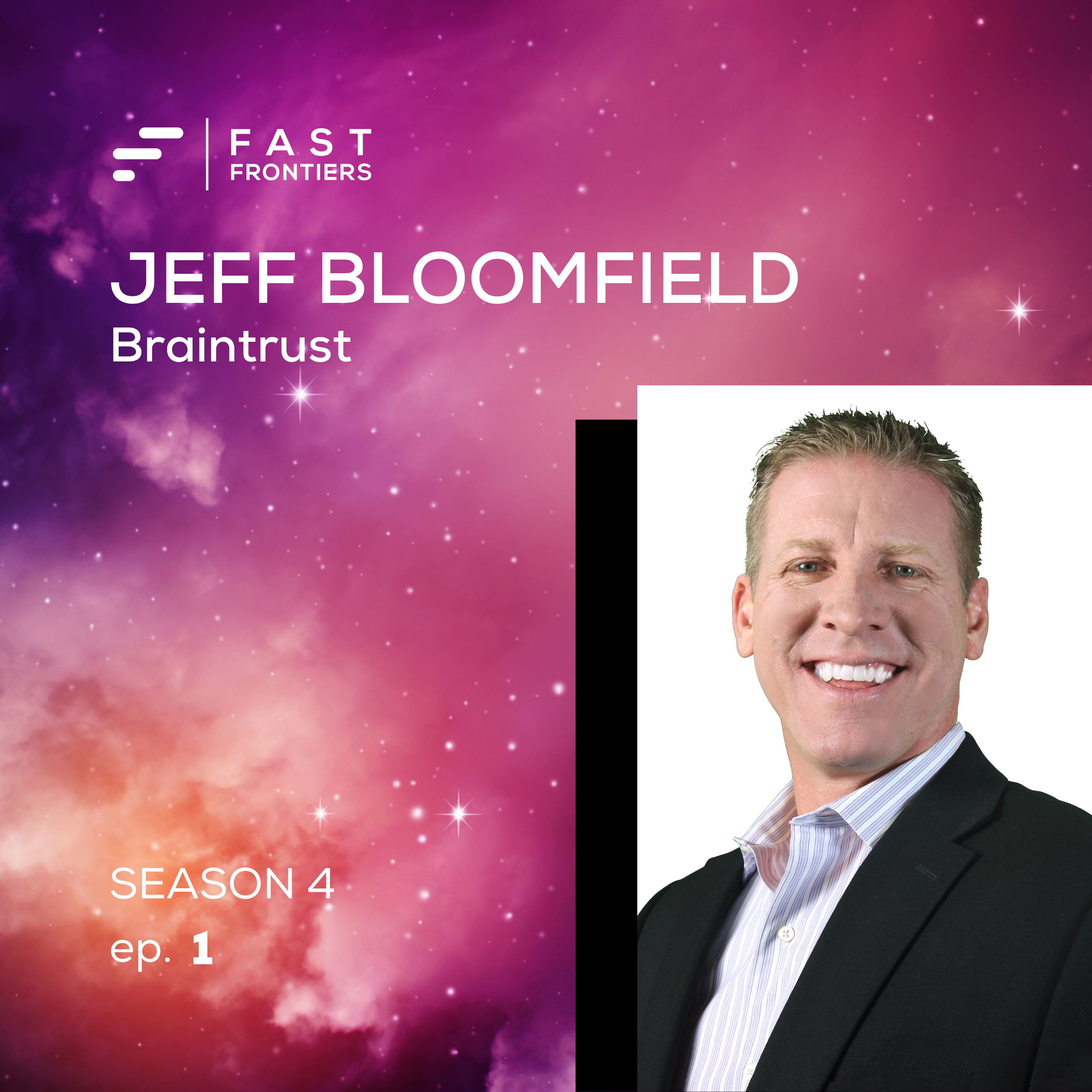S4 Ep 1. Jeff Bloomfield: Braintrust
- 0.5
- 1
- 1.25
- 1.5
- 1.75
- 2
Tim Schigel: Welcome to Fast Frontiers. I am your host, Tim Schigel, managing partner of Refinery Ventures. In this episode, we're talking with Jeff Bloomfield, founder and CEO of Braintrust. Braintrust helps individuals and companies transform their sales and marketing systems by understanding the power of neuroscience on everyday communication. In this episode, we're going to dive into the reasons why Jeff started Braintrust. The biggest theme, or so what I hope you can take away from this conversation is that it's all about communications. The determining factor of success for a person or an organization is how successful they communicate. If you can't communicate effectively, you're sunk, in every area of your life. Please enjoy my conversation with Jeff Bloomfield. All righty, Jeff. I am so excited to have you on Fast Frontiers today, exploring the benefits of understanding neuroscience, which you can't ask for a frontier that's more fast and cutting edge than that. So I'm super excited talking to you about that topic and how it can apply to entrepreneurs and how they can benefit from some of the key insights that you've learned along your journey, so welcome.
Jeff Bloomfield: Yeah, thank you. Happy to be here, excited.
Tim Schigel: So tell us a little bit about how you came across this concept and how it opened up the world to you in terms of understanding how our brain thinks and how it might be applied to business.
Jeff Bloomfield: I think everybody's got a story, right? And the path you're on today was usually a result of several paths that you didn't even know you were taking a lot of times. And for me, it all started on a farm. I grew up on a hundred acre farm in Northern Ohio and my Pawpaw, who was my grandfather that took his life savings in Kentucky and moved the family up and he bought a hundred acre farm. And that's where I grew up. And I was attached to his hip. He was just this amazing mentor, teacher, communicator. He used to say things like, "Hard work and perseverance, son, that always gets you head in life." He taught me to drive when I was five, standing between his knees on our old green John Deere tractor. I just have these vivid memories of him saying, "Problem solvers rule the world." And he was one of those great communicators where he wouldn't actually give you the answer to the problem. He would just keep asking you questions until you came up with a suitable answer that he felt was going to solve the problem. And as I kind of grew up around this guy, and when he was one of those guys that in a room, he didn't say a lot, but when he started talking, everybody else shut up. And he had this way, he was a storyteller, he was a teacher, he used metaphors and analogies. And he had this other thing that we call in our family, the platinum rule. And he would say that, "You treat other people better than they expected you to treat them. And not only does it benefit them, but it almost always comes back to benefit you." And I grew up with this guy and I just didn't realize what I was learning while I was learning it. So lo and behold, February 2nd, 1982, I got off the school bus to go see Pawpaw like I did every day, head down his 50 yard long driveway. It was normally just his green Chevy Silverado at the end of it. But on February 2nd, 1982, it had a few more cars than usual. And about the time my boot hit the porch, the ambulance came down that snowfilled driveway. And I didn't know it, but as they took him out on a stretcher, that would be the last day that I'd ever get to see him alive. I was just a wreck. I was devastated. He had stage four lung cancer, and he never told me, here his towheaded little protege had no idea. And he was taken in an instant. But what I knew was he wanted me to be the first person in our family to get a college degree. So that made me be good in school. I studied my tail off. I was good in sports. I ended up in college. I'll fast forward to the punchline. I ended up in biotech where I got to help commercialize a drug for lung cancer. And so, I was so passionate about this, right? Because I had personal experience. And they would take you as a salesperson in your first territory into home office and they would quarantine you for three weeks, way before quarantining was the cool thing to do, and teach you everything you needed to know about cell biology, cell proliferation, randomized, placebo controlled, as much data that this farm boy's head could hold. And then they would send you out in your territory and say, "Hey, go tell all this to the oncologist, and they'll write this drug." Now I used to think to myself, "That's the opposite of how Pawpaw communicated." He was a connector and a teacher and he was a storyteller. And so that's how I communicated. And I knew my stuff. I knew all the data, all the facts, all the reasons, but I never led with it. I always told stories and I connected. And then I was a teacher and I would teach them things I didn't think they would know. And my numbers went through the roof, and lo and behold, I kept getting promoted and nobody could figure it out. They kept saying, "He just communicates the opposite of the way we train him." And they asked me to help build a team to launch a drug for brain cancer. So this is the point in my life where I started to really see some things come together, because I'm a nerd. I love to dive into research. So I started diving into neuroscience and neuropsychology, initially just to see how the blood brain barrier interacted with our drug and yada, yada, yada, nobody cares. But what I started to discover was as technology advanced, functional MRI, EEG, PET scans, we were able to take a look inside the brain at such a different degree than we've ever been able to before. And what I discovered was most of the folks who understood what was being discovered were using it for either academic purposes or medical purposes. And no one was really looking at it through the lens of, but wait a minute, 99.5% of the rest of the world are out there just communicating for a living. What does this mean? How does the brain work relative to communication? And so as I started looking at biology, psychology and physiology, instead of looking at them as three different disciplines, I started putting the research together and I started seeing patterns. And the epiphany was, number one, my Pawpaw was a genius. He just had an eighth grade education, yet here I am with hard science validating why he was such a great communicator. And number two, we were training people, myself included, my entire career, in a way that was actually counterproductive to how we are biologically built to change. And that was the impetus for me to start Braintrust 11 years ago, to just teach people just enough about the latest science to help them understand and open up their minds, pun intended, into how we process information so they can be better communicators, personally and professionally. So that's my why. That's why I do what I do. And I think Pawpaw's probably smiling down from that green Chevy Silverado in heaven and on the golden streets he's driving it on now, and probably pretty proud.
Tim Schigel: I'm sure he'd be very proud of you. And that's a great, great story and testament to him, and also to you in terms of honoring him through that. It's so true. And I mean, this country was built on people like your Pawpaw, right? Who had common sense, and they wouldn't be distracted by a lot of mumbo jumbo, as it were. So there's a lot of this stuff we understand intuitively, and good storytellers understand it intuitively, and it's probably easier as listeners of good stories and narrative to understand it. But so many times we get distracted by those details or the technology, as it were, and kind of forget the plot. Right? And one of the reasons I was interested in this subject is because, as a tech entrepreneur and tech VC investor, people expect that maybe my bookshelves are filled with technology books and, see, they're not. They're filled with leadership and psychology books. There's nothing that we can't accomplish if we get people aligned and get their oriented the right way. Right? So what you're working on, I think, is so important and just critical to understanding how to build anything that involves people.
Jeff Bloomfield: Yep, absolutely. And I've been saying this for a long time now, the number one determining success factor for a person, an individual, an organization, doesn't matter. The number one determining success factor is how successful you can communicate. Can you communicate effectively? And it doesn't matter what sphere you're in. It can be personal, marriages, being a parent. It can be a VC company, you're trying to go recruit investors. It could be a tech company trying to go raise dollars. It doesn't matter. If you can't communicate effectively, you're sunk.
Tim Schigel: Absolutely.
Jeff Bloomfield: Every area of your life.
Tim Schigel: My first job, I remember, I was doing work for Proctor and Gamble. And I studied electrical engineering, so I went through all the knowledge and skills training. Right? And I helped them with setting up a computer network or something like that. And I remember this senior person pulling me aside and said, "Son, there's something you understand that's more valuable than those technical skills, which is how to communicate what it is you're and what those things are to somebody like me, who has no concept." And that always stuck with me.
Jeff Bloomfield: One of my favorite quotes, and this would serve all of your tech folks and friends well out there, is from Albert Einstein. "If you can't explain it simply, you don't understand it well enough." I was thinking about this before coming on your podcast. Think about all the different types of training that you've gone through in your career, for everyone out there listening. Think about all the different courses you've taken, classes you've been a part of, trainings you've taken professionally, personally. How many of those were actually designed to help you communicate more effectively? Almost none, almost none. There's such a limited amount of teaching, training and equipping on effective communication in the world today. And yet it's the number one determining factor of success. Isn't that just the greatest irony?
Tim Schigel: Right. Amazing. So give us a little baseline in terms of some of the key ways our brains work, that once you understand, it helps kind of unlock some of these mysteries.
Jeff Bloomfield: And I'll try to hold true to Einstein's principle on explaining it simply, so your listeners don't want to shove pencils in their eyes while they're driving around listening. There's been a lot of research, particularly over the last 30 years. Started way back when Dr. Paul MacLean created the triune brain theory and the idea that we have three brains. We've got the neocortex, the limbic system, and then the reptilian brain or the root brain, and they have different functions. And he started to pioneer some of this. And even though he was looked at a little bit skeptically by a lot of his peers in neuroscience, "You're oversimplifying the brain." And he was probably thinking, "Yeah, because nobody quite understands it, so we have to simplify it." And as research has evolved, a good example of this was Daniel Kahneman. He's famous. He won a Nobel prize for his work called the prospect theory. He wrote Thinking, Fast and Slow. He basically characterized the brain into two systems, system one and system two. And then one of our PhD research partners, Dr. Tony Jack, over the last 10 years, he did a tremendous amount of research. And I'll simplify this because this is where the rubber meets the road. He was able to basically replicate Daniel Kahneman's research, and he was able to break the brain down into two networks, the analytical network and the emotional empathic network. And this isn't left brain, right brain. That's kind of been debunked. Yes, we have hemispheres, but the brain is a lot more complex than that. What Tony's work found was that the analytical network and the emotional empathic network, couple key points. Number one, you actually can't activate them both at the same time. You have to vacillate between the two. That was a really big kind of reinforcing finding.
Tim Schigel: Yeah. That's interesting, right? They're kind of sequential. It's kind of like your car. You're either in drive or in reverse. You're not in both.
Jeff Bloomfield: Correct. Now what he found was, I mean, a lot of people can go in between them really quickly, but you still can't activate them both at the same. The second key learning that he found was that the analytical network, its primary role is evaluation, analysis, comparison. It's not open to new ideas. And the only role it has in decision making is validation justification. Now, hold that thought, because the emotional empathic network, relational, emotional, feelings, trust, meaning, open to new ideas, initiates decision making. So now think about that. Now think about our typical style of communication. So if you're someone I'm communicating with and I'm trying to convince you that I'm credible and I want you to like me and I want you to see that I'm smart. I want you to see that I'm useful, or whatever the case may be. I inadvertently just activate your analytical network. And that part of the brain, when you've activated it, its instinct is to be skeptical because it's in evaluation mode, comparison mode. So I was trying to say, in the world we live in today with all the different information and all the trying to sort out real news, fake news, socially, our brains have become just highly tuned to BS, that if you're in my analytical network, I automatically assume that you're probably telling me something that's not true. Isn't that crazy?
Tim Schigel: Yeah.
Jeff Bloomfield: Or that I have to really kind of dig in to see what's your angle. Whose agenda are you really on? Are you really here to help me? Or is this about you?
Tim Schigel: Right. It's like you're building all these little walls and fortresses in your brain as you're hearing the person talk.
Jeff Bloomfield: Absolutely. And the other person doesn't even know they're doing it. They don't even know they're doing it.
Tim Schigel: There's an interesting little side note on that, which is really to empathy. When you are focused on the other, you naturally will convey and communicate properly. If you're more focused on yourself, "How am I performing? How am I going to look? How am I going to be perceived?" You take the wrong road. Kind of interesting. The other thing that I've heard in the past, I'm assuming you're going to say this is correct or you confirm it, but maybe not. And when I realized this years ago, I was like, "Wow, this opens up," is your brain basically can't go to the analytical part until it gets sort of the okay and you clear the emotional part. Like until I get past the safety and the trust and all those issues, if I'm not past that, I'm not listening or buying anything you're telling me.
Jeff Bloomfield: Well, this is where it gets really fascinating, Tim, is that in a sales engagement, I automatically, if I'm the buyer, I automatically assume just from subconscious default setting that you're here on your agenda. So what emotion has been evoked in me is generally fear because there's risk. And I kind of know you're going to come in on your agenda. So my emotion is staying in that either fear, maybe a little bit of frustration or doubt whatever that is. I don't stay in that emotional place. I can't stay in that emotional place when you give me facts. I actually have to activate my analytical network. But because the emotion that rooted the activation of the analytical network was fear or skepticism or whatever that was, now my analytical network is looking at everything through the lens of why I shouldn't believe what you're saying. Now, if you enter in a conversation and you activate my emotional empathic network, something suddenly shifts. And remember I said that we looked to validate and justify with the analytical network. If I really trust you personally and I feel like there's some degree of empathy and relatability, suddenly now when you start activating things in my analytical network, I'm actually looking at them through a different lens. I'm actually looking at why I should believe them. It's amazing.
Tim Schigel: It's a confirmation process.
Jeff Bloomfield: It absolutely becomes a more confirmatory process because I want to believe you because I trust you. Or at least my instinct tells me that you're trustworthy.
Tim Schigel: What have you seen in terms of how people naturally respond? Some are gifted, some aren't, as it relates to the personality profiles, the Myers-Briggs and the eneagrams, et cetera. Have you seen any correlations or one type of person adapts to some of your message and training better than others?
Jeff Bloomfield: It's a great question, and here's the great irony. If you'd asked me this 10, 11 years ago when I started this company, I would've said, "Oh, we'll attract those really empathic storytellers. Those people that are feelers. They'll just they'll eat this up and they'll be great at it." It's actually been the opposite. We have not only attracted the more thoughtful, almost introverted engineer type. And why they're so attracted to what we do is, is because they love the science and they love that there's a process to this. And they can feel like they can map it and it gives them a roadmap. They knew in their gut, the instinct is they feel like sometimes they don't come across the right way and they don't get the response that they want, but they didn't know why. And so this science kind of lets them go , "Oh. Yes, it may not be comfortable for me to go empathic or emotional, but I get the science behind it." Where sometimes the feelers and the natural empaths, they're just story meanderers. And they come in and they just wander all over creation. Right?
Tim Schigel: Right, right.
Jeff Bloomfield: And they never kind of follow what we call the emotion coaster. Because a great influencer knows how to go inside out, inside out, inside out. Right information, right time, right order.
Tim Schigel: So it's interesting. So the person that's more analytical, maybe techy, that's drawn to this, giving them a roadmap or a foundation, kind of helping them understand how it works really is satisfying an inner fear that they have. The fear being, "I don't like going out on this journey without understanding how it works. I want to know that my tires on the car are inflated. I want to know it's safe. It helps me to know that, then I'm okay traveling."
Jeff Bloomfield: And here's the irony of that again, Tim, is that if you ask someone like that, they'll say, "This is very logical for me. It's a very factual, rational, logical approach." I'm like, "No, no, it's actually a very emotional approach for you." They're like, "No, no it's not. Didn't you hear what I said? The tires have to be full, the air..." I'm like, "But why? Why do those things have to be done?" "Well, because I fear." "Oh, you fear."
Tim Schigel: Fear, right, right.
Jeff Bloomfield: "Oh, there was some emotion associated with your adoption. I see now."
Tim Schigel: Exactly. So let's talk about that, because I know you've mentioned before and there's plenty of data backing this up in terms of that fear of loss versus pursuit of gain. Tell us what you know about that and how that impacts this.
Jeff Bloomfield: And again, I referenced Kahneman earlier. In their study, their work, they won the Nobel prize on with prospect theory, essentially what he and Amos Tversky found was, and I think most people would agree with this when they hear it, because our brains are wired for self-preservation. That's kind of our default setting, right? We wake up in risk mitigation mode. Our brains are wired for that at a subconscious level. What they found was when I communicate with someone who I'm asking to do something different, I can say, "Here's what you stand to gain if you do something different, if you do what I'm asking you to do." Or I can tell you what you stand to lose if you don't do what I'm asking you to do. And they wanted to see if there was a difference in the urgency for someone to take action. Now, what they found was people will take action at twice the urgency to avoid a loss as they will to pursue a gain, twice. And it's all rooted back in our self-preservation.
Tim Schigel: I don't know how to put an exclamation point on a podcast, but for everybody listening, I mean, I think it's a classic startup or entrepreneur mistake, something we focus on quite a bit at Refinery Ventures, which is to focus on the customer problem, not your solution. And I think people know that sort of, but they never really go there all the way. Almost like people are afraid to expose the full extent of the problem attack, potentially, or not talk about maybe the negative or what have you, but it's totally consistent with what you're saying. If you understand how to communicate the customer problem, the customer says, "Ah, you get me. And if you get me, I'm going to listen in an open way to the tech feeds and speeds and everything else that tells me you know how to solve it."
Jeff Bloomfield: That's exactly right, Tim. And here's the key though. I want people to hear this. So this isn't about fear mongering. That's not what this is about.
Tim Schigel: No, no.
Jeff Bloomfield: This is literally biology. And problems, by their very nature, when discussed evoke emotion. Products, by their very nature, when discussed evoke judgment, evaluation.
Tim Schigel: Wow.
Jeff Bloomfield: Now think about that. So emotional empathic network: problems, analytical network: products. Because I have no choice. I have to actually evaluate them based on what you're telling me about your products and blah, blah, blah, blah, blah.
Tim Schigel: At this point, you say, "I've got a problem. I got to pick A or B."
Jeff Bloomfield: And so what happens is, is some people think, "Well, I can't go in there and be like,' Problem, problem, problem.'" I said," Well, here's the issue. You keep calling your new tech invention a solution, but what's the definition of a solution? Something that solves a problem. Well, are you just allowing me to figure out whether I got a problem or not?" Because if you just bludgeon me with all the reasons why your new greatest tech product saves the day, it's analytical network. And I'm going to be in risk mitigation mode, comparing everything you're telling me to what I'm currently doing. And by the way, I'm currently doing it because I thought I made a good decision when I started doing it. And now you're telling me I should do something different with all these facts. Well, my analytical network's telling me, "Hey, don't let that in. They're probably making up half these facts and this can never be as good as they're saying," because it's all outside in versus inside out. So you got to not only talk about the problems that your prospects care about, you have to get them to participate in the story. When they begin discussing how they care about the problem, they help you quantify the cost of the problem. It creates urgency subconsciously in their mind to solve it or solve it in a more creative way. They're, again, open to change because now I'm basically admitting I have a problem. Because I brought up a problem and you agreed that it's a problem. Now we're discussing the story around the cost of the problem of either solving it incorrectly or not solving it all. And the whole time I'm in your emotional empathic network and you're actually defining the story. So when it comes time to go to the analytical network, you're actually open to ideas on how to solve this. It's the right order.
Tim Schigel: Perfect. But it also seems that when you think about this, that the fear of loss has a bigger magnitude than the pursuit of success or gain, as an entrepreneur, I think it really helps you reframe the way you look at the world. People are familiar with, "Oh, you fail fast, fail frequently. Entrepreneurs fail, blah, blah, blah." I don't look at it as fail. I no longer have that adverse reaction to, "Oh my gosh, I don't want to lose. I don't want to lose," because I've reframed it as, "That's not a loss. That's a learning." So I've basically train my brain not to even think about it as loss, but rather an opportunity. And once you do that, it seems to me, the world just starts looking different.
Jeff Bloomfield: Yeah. I had this epiphany recently in some of my quiet time. As an entrepreneur myself, I always felt like I had a fear of failure. A lot of entrepreneurs out there might be going, "Yeah." And I felt like a lightning bolt, that God said, "You don't have a fear of failure. You have a fear of what you think other people will think if they think you failed." And I went, "Oh, wow." Because I really don't have a fear of... because I don't look at it as failure. And if you're an entrepreneur, you kind of know. Part of the process is if I'm not scuffing up my knees, I didn't run fast enough to fall down. It means I wasn't aggressive enough in my innovation or my ideas. But I think when you separate the great entrepreneurs, the great innovators, and like him or love him, I look at someone like Elon Musk. And you can argue that maybe he's on the tail end of the spectrum, whatever the reason being, but he just simply doesn't care what others think. He doesn't have that filter. And so it allows him to just innovate without any fear of what could go wrong, because he expects things to go wrong and he expects to take what goes wrong and apply it to a better version. And he could care less what people think. And for some of you out there right now, you're probably thinking, "Oh my gosh, I'm getting hives thinking about that." Because we get so wrapped up around what we think others may think of us in A, B and C, whatever environment it looks like. And it really kind of puts a dampen on our ability to take risk and be innovators.
Tim Schigel: So how can people train themselves, if they do have some of that fear or they recognize that fear in terms of going in to talk to a customer or going in to talk to investors, et cetera. Have you found some techniques or methods to get into the right head space before that so that you can communicate and interact confidently without fear of failure?
Jeff Bloomfield: Yeah. There's a couple big things. And I do these, some of personally and some we coach on, and I think are really valuable. The first thing I always ask myself, and I don't always get it right. And I don't always answer myself correctly. "Whose agenda am I on?" I'm about to go into this podcast with Tim, who I love, who I think is an amazing, creative innovator. Am I here to try to make his audience think I'm smart? Or am I here to help his audience take some information that God's given me over the years and apply it in their life in a way that makes them go farther faster. If it's the latter, this will be a home run podcast. If it's the former, people tuned out 10 minutes ago, maybe 20. And so the first thing is always, "Who's agenda am I on?" Am I here to make this person's life better? Or am I just here to convince them that I need to be better? Or that I have the right answer or I have X, Y, and Z? I mean, that's a really, really big one. Whose agenda are you on? Because that applies across the board in all of your conversations in your life, personally and professionally. The other one is, and I do this with my kids sometimes, and I have a 20-year-old, a 16-year-old and an eight-year-old. When I sense they're going through a place where they're really afraid to do something, I do the, "Well then what happens?" And I make them go, "Well, then what happens?" at least five times, kind of like the five whys. And at the end, it always comes down to," Well, it really wasn't that big a deal if it didn't go right. Was it?" And I think we have such degrees of failure, if you walk through that. "Well, I have to go give a speech at school tomorrow, and I'm all wrapped around the ax. So I don't know if I can do it, Dad."" Okay. Let's say that you get up in front of your classroom and you pee your pants. Then what happens?" You leave, you go to the nurse's station. Then what? We walk it all the way through and guess what? When you get home, we still love you. Everybody still loves you. Nothing's changed. You're still the same kid you always were. And so getting your mind to go do that exercise, "I'm about to go pitch to all these investors. And I'm terrified." This is an example. Right? Okay. Well, let's play it out. Are you prepared? Have you thought about this pitch from their perspective or are you just pitching your product? Have you thought about the storyline you're going to give? Have you practiced it? Have you rehearsed it? Do you understand why you're there? Have you thought about what happens if you get up and you completely bomb your opening joke? Have you thought about what happens if you get up and you completely bomb the whole presentation, and all those investors walk away and don't give you any money. Then what happens? Just right now, some people are having terror sweats right now, just thinking about that example. But the point of it is, is I think it all goes back down to our identity, and mine's rooted in my faith. And if I walk that back far enough, God's still pleased with me. He still says I'm a favored son, and nothing's changing that. So whatever you're rooted in, in your identity, when you walk that back to that point, everything falls away. And then you can operate from this unconscious competence without fear.
Tim Schigel: That is good. That is good. I'm not sure how we can beat that. I mean, the applications to, as I mentioned earlier, to your business, to life, to your relationships, at home, it's so important. What are you most curious about in terms of the brain, learning about the brain? Is there a next frontier that you've been watching or anxiously awaiting to answer a few other questions about how our minds work?
Jeff Bloomfield: Yeah. That's a great question. And it's not, not really, I wouldn't describe it as in the metaphysical space, but what I'm learning is that there's a degree of energy that as human beings, we all produce. And there's something at an unconscious... We know that there's a thing called emotional contagion now. We know that, right? We've been able to validate with research, and you know, you can create a viral contagion of emotion simply by being around someone who's either super positive and you're suddenly like, "I feel better," or someone who's super negative and you feel, "I feel like I need to go take a nap."
Tim Schigel: Exactly.
Jeff Bloomfield: We know that. What I'm really curious about is, and it's not even a telepathy thing. It's that unconscious energy influence that our mindsets create that has this ability to function almost outside of ourselves and influence others simply with our energy, not just with our words, but with our energy that's produced in our minds, and the ability to put yourself in that brain state that you're operating at that level. There's a lot of new research looking at that now, and I'm just fascinated by it. Not from a sales or marketing or coaching standpoint, but from a human condition standpoint. Can we be better humans in knowing these things and being able to do the mindfulness work to put us into that place? That's what I'm really excited about in the future.
Tim Schigel: I agree. That's why I have these stickers. And there's only been one person that's figured it out, these stickers on my laptop. One's Jimi Hendrix. The other is Shrödinger's equation from quantum mechanics. The question is, "What do they have in common?" And the energy, Jimi Hendrix figured it out. The energy is love, basically. Right? You can communicate emotion and love to a family member on the other side of the world, and it has an impact. Right?
Jeff Bloomfield: Yeah.
Tim Schigel: They can start to cry, whatever it might be. And you say, "How does that happen?"
Jeff Bloomfield: Yeah. And we don't know.
Tim Schigel: We have no idea. We have no idea.
Jeff Bloomfield: But we know it's real.
Tim Schigel: Absolutely. Matter of fact, Richard Feynman, one of the greatest physicists that ever lived, has said, "The one thing we still don't know. We know how to measure it. We know how to do all these things, but we still don't know what energy is."
Jeff Bloomfield: Right. Yet the entire universe we know now is made up of it.
Tim Schigel: Yeah. We know how to measure it and watch it and track it. We just don't know what it is.
Jeff Bloomfield: Yep, yep. And for those of you out there right now who are saying, "Well, this just took a left hand turn into Voodooville," here's what I want you to think about. The big term now that everyone's using through this whole pandemic thing is, "Well, the science is settled." Anyone who ever says the science is settled, you should run. And I'll give you an example-
Tim Schigel: We didn't need consensus to figure gravity actually is a thing, right?
Jeff Bloomfield: We did not. We did not. For centuries, I guess, really, since Newton, we've been subscribing to Newtonian physics, but then along comes all this new discovery around quantum. And now it's quantum is challenging some of the thinking around the Newtonian physics. And we're starting to see that maybe there's a thing to this energy stuff that we're not quite sure. So for those of you out here right now, who are saying, "Well, we should wear a mask," or, "We shouldn't." Not to go down that path, but listen, we don't know what we don't know. And this thing on energy, we don't know, and we're learning it. And there's something about it that's universally subconsciously powerful, and we're going to get there. We're going to keep... And I think it's divine. I think it's something that's spiritual. I think it's something that is universally spiritual. And I think as humans, we're just starting to touch on, we're on the precipice of starting to know it exists. And then eventually, hopefully, it'll be revealed to us how we can utilize it for more positive impact on the humans around us.
Tim Schigel: Very exciting. I love that stuff. I think there's so much we don't know. And I hope everybody listening stays curious. Remembers Descartes, question everything. Right? Ask why five different ways to try to understand more and more about the world around you and about the other person. And if you understand more about the other person, you're likely to be more successful in whatever you're doing.
Jeff Bloomfield: Absolutely.
Tim Schigel: Jeff, thank you so much for being on Fast Frontiers. It's great to have you.
Jeff Bloomfield: My pleasure, anytime.
Tim Schigel: Thanks for listening to Fast Frontiers. If you like our show and want to know more, check out our website, fastfrontiers. com. If you enjoyed this episode, please share it with others and leave us a review on your favorite podcast platform. Welcome to season four. Join us next week when we bring you my conversation with Sarah Anderson, founding partner of Vault Fund, a new fund focused exclusively on venture studios. The Fast Frontiers podcast is brought to you by Refinery Ventures. Our producer is Abby Fittes. Audio engineering by Astronomic Audio. Marketing content and social media support from Content Callout. And our podcast platform is Casted.
DESCRIPTION
In this episode, we're talking with Jeff Bloomfield, founder and CEO of Braintrust. Braintrust helps individuals and companies transform their sales and marketing systems by understanding the power of neuroscience on everyday communication. In this episode, we're going to dive into the reasons why Jeff started Braintrust. The biggest theme, or so what I hope you can take away from this conversation is that it's all about communications. The determining factor of success for a person or an organization is how successful they communicate. If you can't communicate effectively, you're sunk, in every area of your life.
Today's Host

Tim Schigel
Today's Guests








